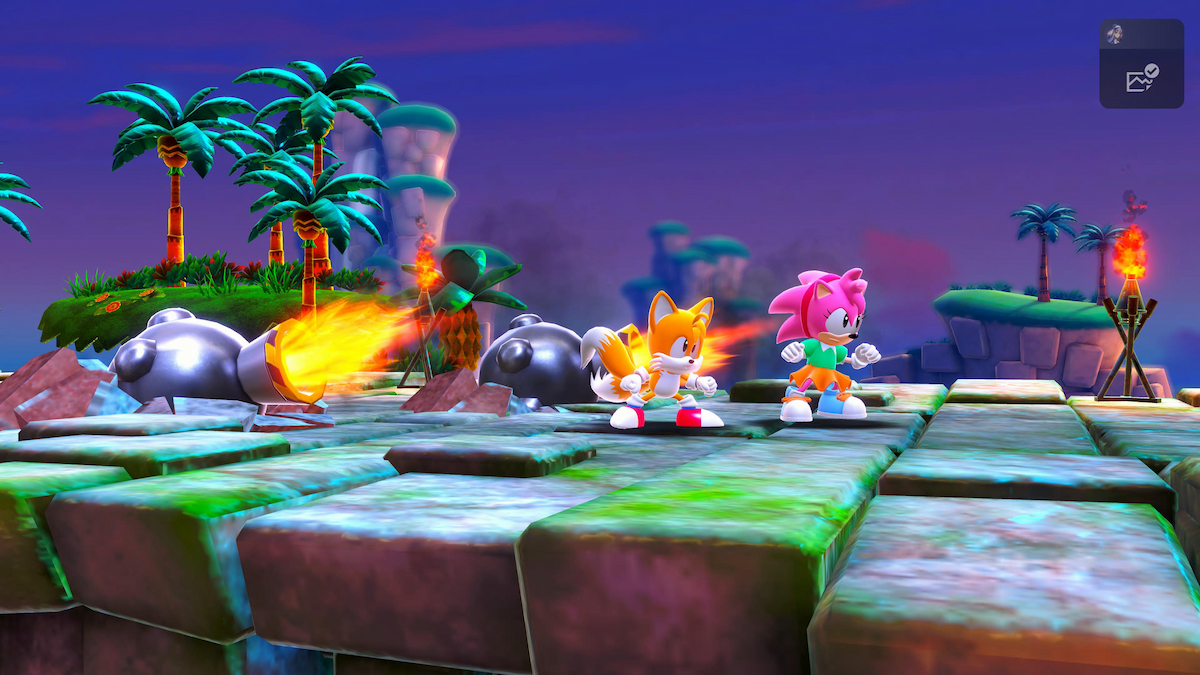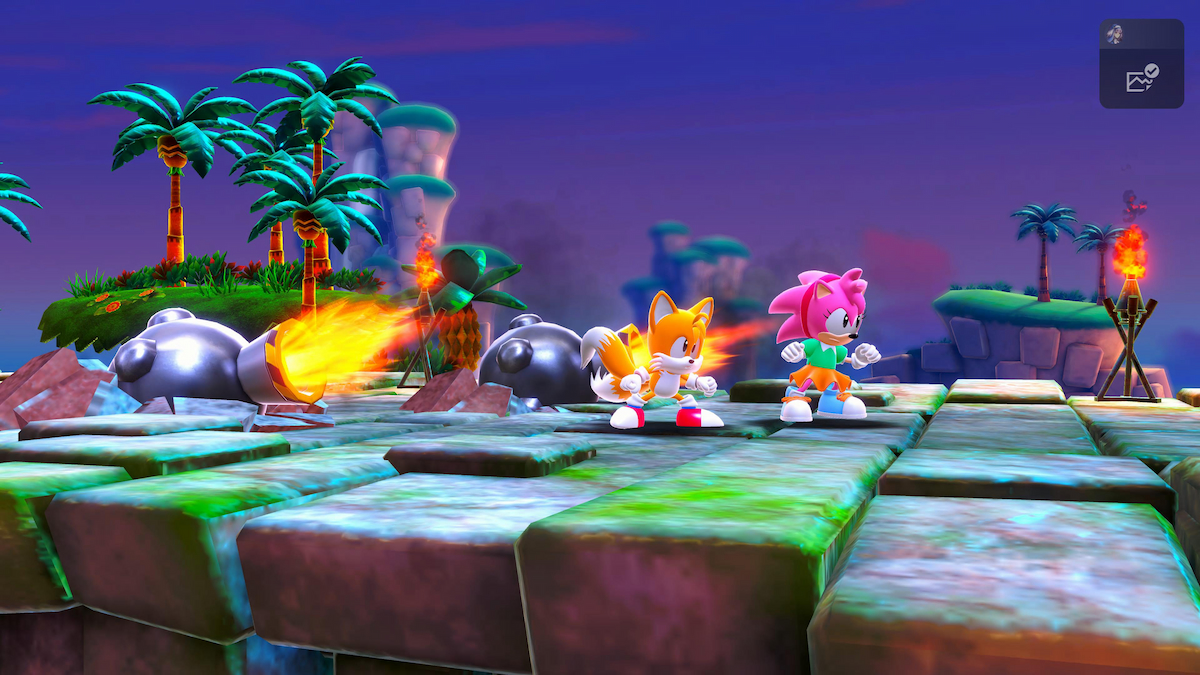I can’t remember the last time I was as upset with a game as I am with Sonic Superstars.
I don’t talk about this enough, but growing up, I was a bit of a Sonic kid. There was a time when I considered Sonic 3 & Knuckles one of the greatest games of all time, and I’ve continued to appreciate it as time goes on. That title wasn’t just great because of its finely tuned platforming mixed with breakneck speed. It also offered memorable levels, amazing music, unique characters that offered replay incentive, and a story with twists and turns told without words.
Sonic games, at their best, are legendary. And when Sonic Mania came out back in 2017, the potential for another golden age of 2D Sonic games seemed tantalizingly real.
That brings us to Sonic Superstars, which has the key ingredients for a fantastic Sonic game. It has clean and charming visuals, some stellar music, and new innovations like Emerald Powers and four-player co-op. In fact, when I played a demo of it a few months ago, I actually really liked it! That slice of the game was wacky multiplayer fun, with levels that featured a lot of neat gimmicks. I’ve looked forward to playing Sonic Superstars since, and by the time I sat down with my controller in my hands, I was really in the mood for some good old classic Sonic.
This is not good old classic Sonic.
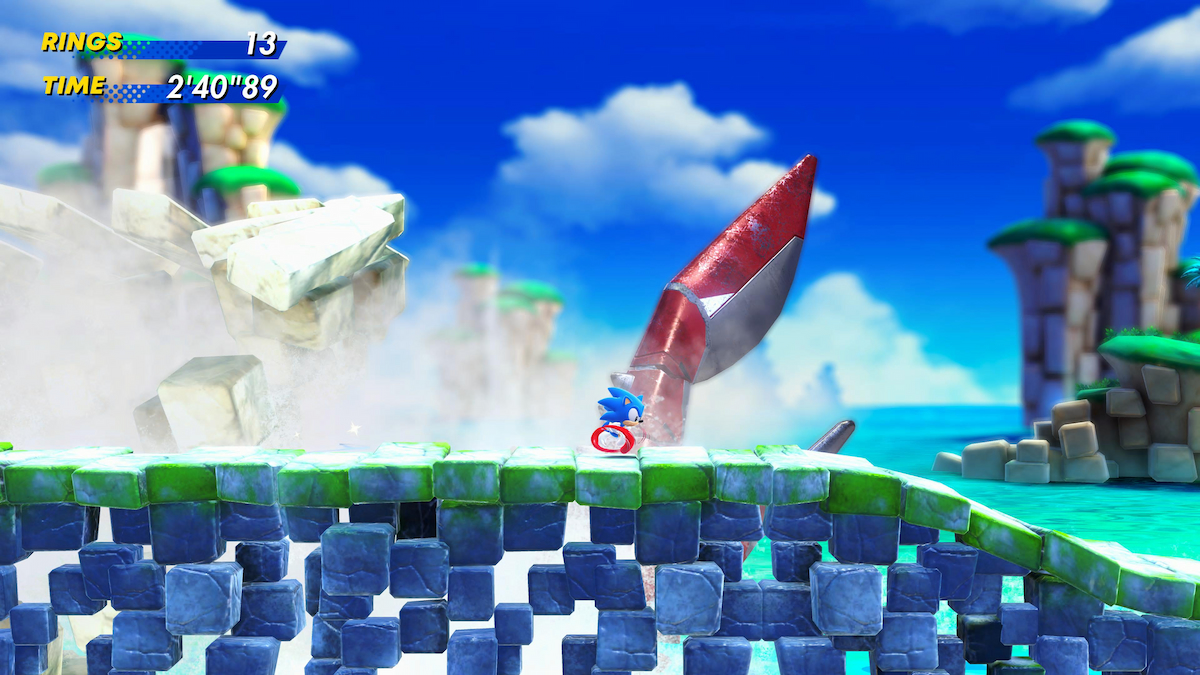
Sonic Superstars (PC, Nintendo Switch, PlayStation 4, PlayStation 5 [Reviewed], Xbox One, Xbox Series X|S)
Developer: Sonic Team, Arzest Corporation
Publisher: Sega
Released: October 17, 2023
MSRP: $59.99
Get a load of this
Sonic Superstars starts off well enough. The animated intro introduces our core cast of characters as well as our villains: Eggman, Fang, and what appears to be some robot. Sonic, Tails, Knuckles, and Amy are all playable from the outset, and they all control just how longtime fans would expect them to. The one slight exception is Amy, who sports her Sonic CD look and has a handy double jump. Sonic Superstars wants to evoke the Genesis Sonic games, and on a very superficial level, it succeeds.
Much fuss is often made about the physics of Sonic games, and Superstars feels basically right in this regard. Playing on my PS5, I couldn’t directly compare it with something like Mania. But movement felt at least roughly the way it should. Gimmicks like flying around as Tails felt familiar, so my muscle memory from the Genesis days was intact. It does seem like the game borrows its core physics from Mania, with its slight changes like Knuckles having a small delay when he falls on the ground. But with how good Mania was, I’m perfectly okay with this.
Even in its first level, Superstars leaves a generally strong impression. Listening to upbeat music while spin dashing through loop-the-loops felt great. That rhythm of slow platforming building up to those moments of sheer speed gave me that classic Sonic rush. Unfortunately, shortly after this, the cracks began to show all over Superstars’ design.
You’re not good enough to be my fake
Level design in Sonic Superstars is a persistent issue. Some believe Sonic games are about speed, but going fast and racking up rings is generally a reward. Those adrenaline rushes motivate you to brave trickier paths or tackle tough platforming challenges just to get to that next roller coaster. Meanwhile, in Sonic Superstars, I quickly found that the last thing I ever wanted to do was go fast.
I don’t mean through those scripted, speedy sections. Those were usually fine. But for much of the game, I found that maintaining even moderate speed consistently resulted in getting hit by something offscreen. Enemies and obstacles often appear in front of you without giving you enough time to react to them, resulting in cheap hits even when you think you’re in a safe section. Sonic Superstars is not a hard game; it’s just easy to get hit.
Superstars exasperates this issue with a few of its level-specific gimmicks as well. For example, in the jungle level, you’ll grind down vines at high speeds. Great idea, except you can’t enter your ball form, making you susceptible to any surprise enemies that pop up. In another level, a persistent countdown in the background will instantly kill you unless you hit switches throughout the level. So it’s basically the mechanic of finding bubbles when you’re underwater, except the distribution of those switches is really inconsistent. Even when you know the optimal path to go, juggling this mechanic doesn’t really add anything other than another excuse to reset your progress.
Many levels just feel off, with uninspired gimmicks that seem like desperate attempts to make each level feel distinct. In fact, even some of those tightly scripted speedy sections spilled me right into spikes or obstacles. In classic Sonic games, I could eventually get into a sort of flow state where I was just engrossed in the level design and platforming. But with Superstars, I felt like the game always snapped me out of any groove I was on the verge of entering.
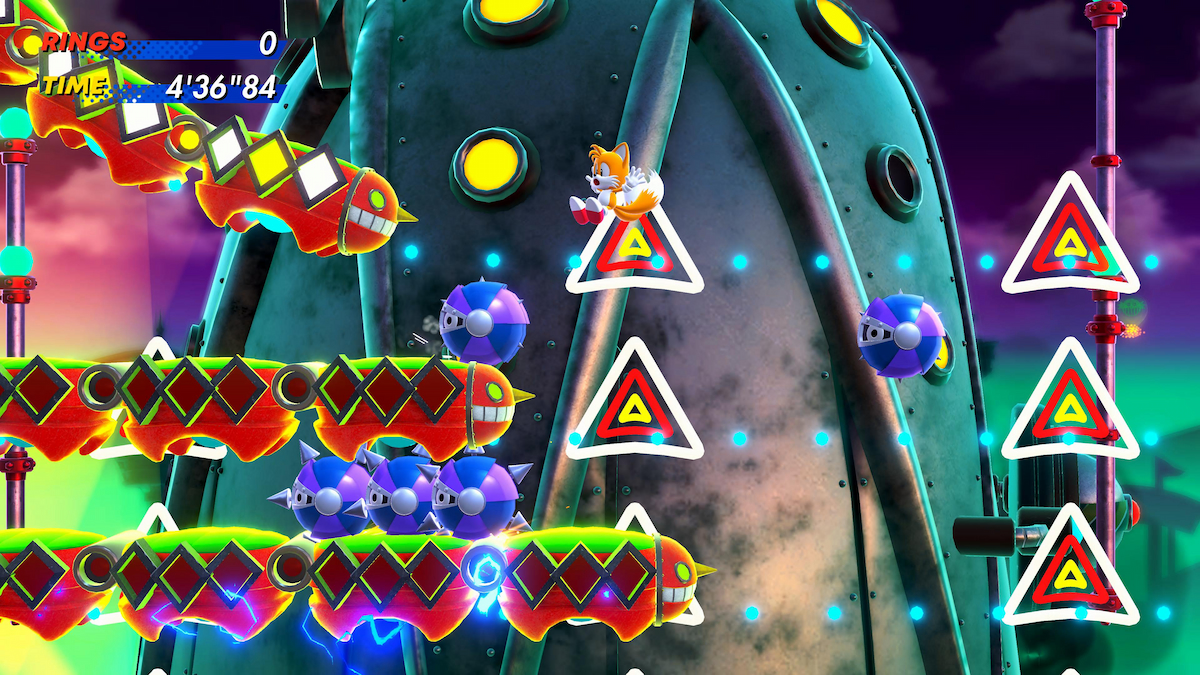
Chaos Control
Of course, Sonic Superstars has two new tools that should, in theory, counteract some of these rough edges. The first is the Emerald Powers, which you can earn whenever you find the hidden bonus stages in each zone.
I do quite like these in concept, honestly! Whenever you acquire one, you can equip a power using the right thumbstick and activate it with the press of a button. You can use each power once, and powers replenish whenever you hit a checkpoint. Some of these can be useful. For example, the power shown in the opening cinematic that makes several clones of your character rush across the screen works as a serviceable screen clear. The bullet power, which lets you repeatedly dash in any direction (including through the air), also has decent use cases.
However, in practice, many powers add functionally nothing. On screen prompts will inform you to, say, use the water power that lets you swim up waterfalls. Outside that context, that power might as well not even exist. Another power lets players reveal secret rings and platforms that wouldn’t appear otherwise. So, obviously, unless the game tells me to use it, I’d have no idea where to use this power since it reveals things I can’t see.
I wound up only rarely using Emerald Powers outside of those prompts. They’re nice in the situations you can make them work. But in general, this feels like a feature that solely exists to put something on the back of the box. I did use them occasionally during boss battles, but don’t worry, I’ll get to that can of worms later.
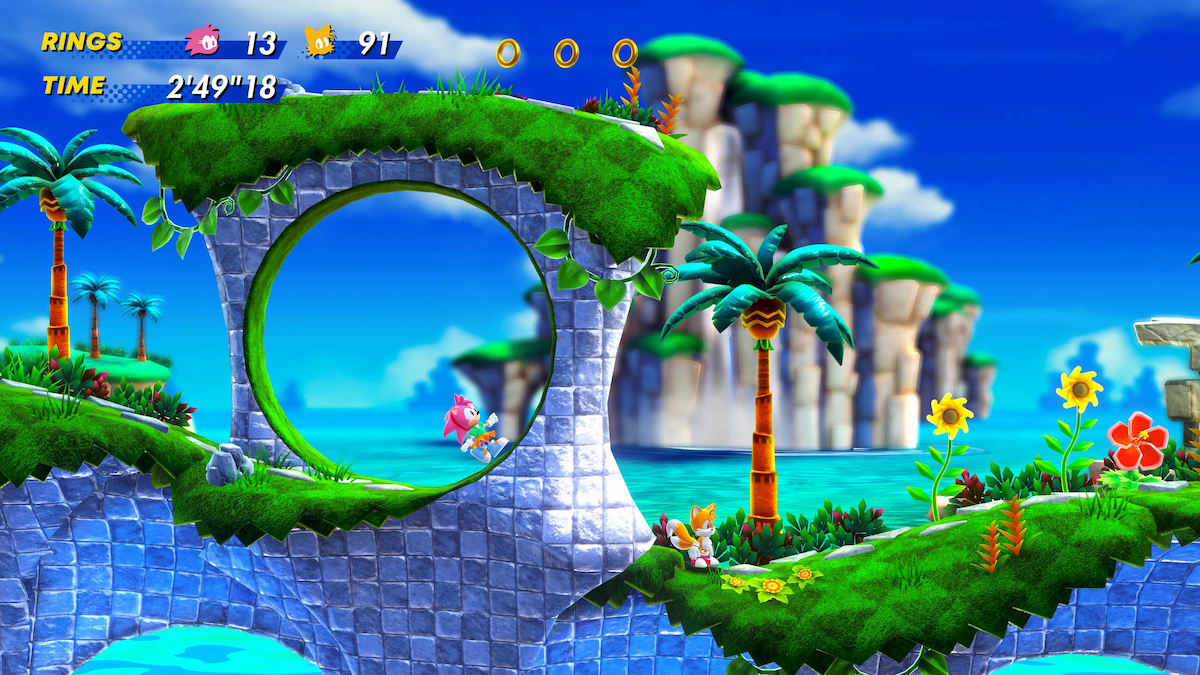
And we all did it together
Sonic Superstars’ other major innovation is its inclusion of four-player co-op. Now, in my first impressions, I said that co-op in a 2D Sonic game is a fundamentally broken prospect. Superstars adds useful systems to make co-op play work, so it’s certainly better than multiplayer Sonic 2 or 3. For example, a player left behind can instantly warp back to the location of whoever is further ahead. Unfortunately, despite my great first impressions of the demo, co-op play is impossible to recommend in the full game.
To test the multiplayer, I once again enlisted my girlfriend, who is somehow not sick of playing every platformer I want to review. Given that I’m at least a moderate Sonic fan and she’s only played the Genesis titles a few times as a kid, our results were mixed. She often felt frustrated by how easily she could get left behind, and she eventually had a hard time tracking where she was on the screen. When you try to play Superstars with people of varying skill levels, the multiplayer really falls off.
As she put it to me after our session, “I wouldn’t not play Sonic Superstars, but I wouldn’t offer to play it either.” Unfortunately, even if she wanted to continue our session, we would have run into some major issues.

Actually, it’s not really multiplayer
I originally planned to write about how Sonic Superstars works as a sort of pizza and beer (or soda for the kids) co-op game. You know, the type of chaos simulator where you and a friend can laugh off the rough edges and just enjoy some good company. Except Superstars quickly proves itself to be deliberately hostile towards its own multiplayer experience.
First of all, after you complete the campaign in Sonic Superstars, you can unlock a few extras to lengthen your total playtime. However, any and all gameplay you unlock after the fact is solo only. Additionally, even within the main campaign, you’ll be forced into single player levels regardless of whether or not you’re playing multiplayer. For a game that markets itself as a multiplayer experience, this is straight-up unacceptable. Anything good I could have said about Superstars as a co-op experience is nullified when so much content locks out your friend(s).
As it is, the game is vanishingly short if you play just the main campaign. My run, which involved collecting all the Chaos Emeralds, took me about six hours. I don’t typically complain about how long a game is, but I can’t imagine dropping $59.99 on a game to play with friends just to get this little out of it. Could you replay it with different characters? Sure, I guess. But one playthrough may be enough for most, because it’s time to dive into the big problem with Sonic Superstars.
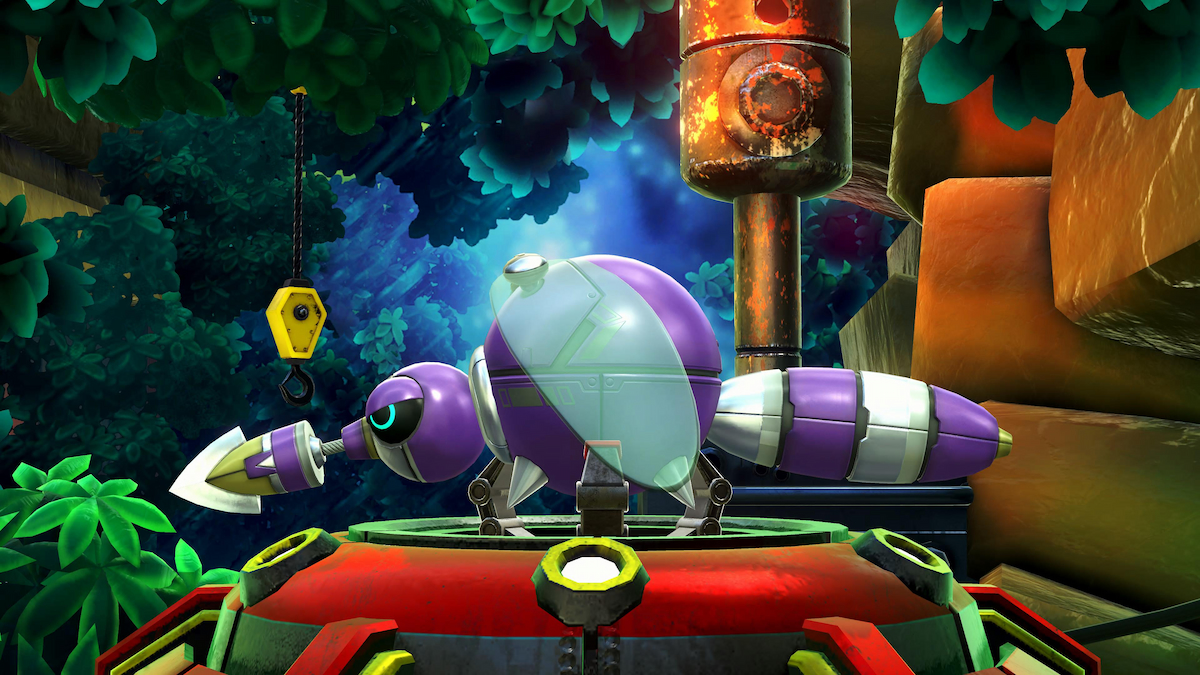
This game of tag is boring
The boss encounters in Sonic Superstars are straight-up unforgivable.
Many can argue whether boss encounters in classic Sonic games are good or not. For me, even in the most uncharitable of readings, bosses at least felt like quick skirmishes. Most don’t take that long, and even the more infamous bosses have memorable qualities. For example, is it cheap and unfair that the final boss of Sonic 2 can kill you in one hit? Yes. But the imposing music, the view from space, and the designs of Metal Sonic and the Death Egg Robot make for a tense climax. Additionally, once you “solve” the fight, you can clear both phases in about five minutes or so.
Conversely, Sonic Superstars bosses feature some of the most aggravating designs I’ve seen in a modern platformer. You’ll almost always start off in some kind of dodge phase, in which you have no ability to inflict damage. The boss will reveal some kind of vulnerability, you hit it, and then back to the dodge phase. Those dodge phases are consistently way too long, and generally just repeat the exact same mechanics until the boss is on its last legs. While some bosses provide a secondary moment of vulnerability, even perfect play makes these encounters drag to ridiculous degrees.
Now, you may think that doesn’t sound that bad. I mean, bosses in platformers typically go down in about three hits when they’re designed like this. Surely, they wouldn’t need double that amount of hits to go down, right? No sane development team would design bosses like that you’d need to hit six times, right?
Well, I’ve bamboozled you, because bosses in Sonic Superstars can take seven or eight hits to go down. Even the most mundane boss can take upwards of five minutes to finish, and you’ll find them at the end of almost every act.
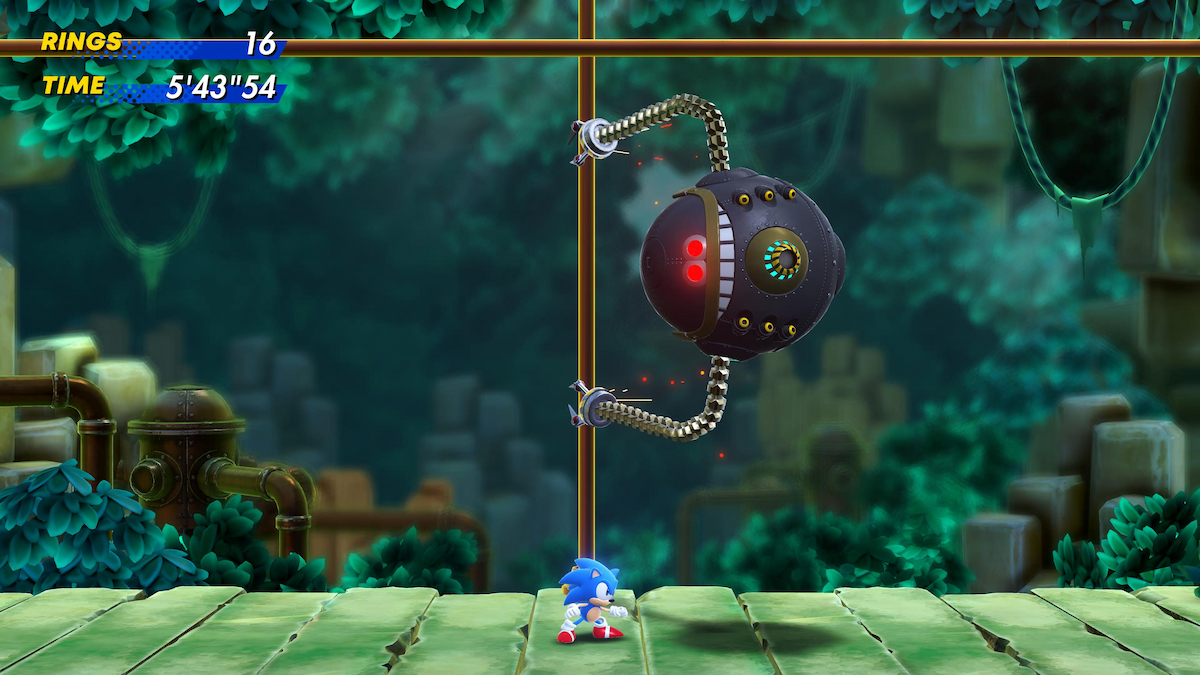
You’re not the boss of me
To make matters worse, Sonic Superstars has one of the worst boss themes I’ve ever heard in a Sonic game. It sounds like a 10-second intro to a longer song that never got completed, so instead of finishing it, they added a key change to hide that it’s looping over and over again. On the plus side, I found a glitch that actually stops the boss music from playing. I took advantage of this at every opportunity.
While I tried to just deal with the boss encounters, they actually got worse the longer I played. Once I had a hang of the game’s weird level design, I started to cruise through each Act quicker and quicker. But for the bosses, there’s precious little you can do to speed them along. I realized that, in many cases, I was spending more time with the bosses than with the levels themselves.
Even the final boss of the regular campaign was so long and tedious that I practically screamed at my screen “Okay, I get it!” A moment that should have been exciting and climactic was instead something I just wanted to end. Meanwhile, a final boss in a mode that unlocks after the campaign was similarly repetitive, except it uses one-hit kill moves to reset you to the start of the ten-minute encounter. I typically like to clear these kinds of challenges just as a point of pride. But Superstars had already so thoroughly drained my patience that I just put down my controller and said “I’m good.”
I can best describe Sonic Superstars as a game that at no point wants to offer an engaging challenge. Instead, it simply tries to make the player get hit or lose a life. It’s a type of difficulty I’d compare to dodging lightning 200 times in the Thunder Plains in Final Fantasy X. Instead of offering an interesting obstacle to overcome, it consumes so much time that the tension comes from the thought of repeating that agonizing gameplay again. It’s like the developers looked at that final boss of Sonic 2 and ignored everything aside from “kill player in one hit.”
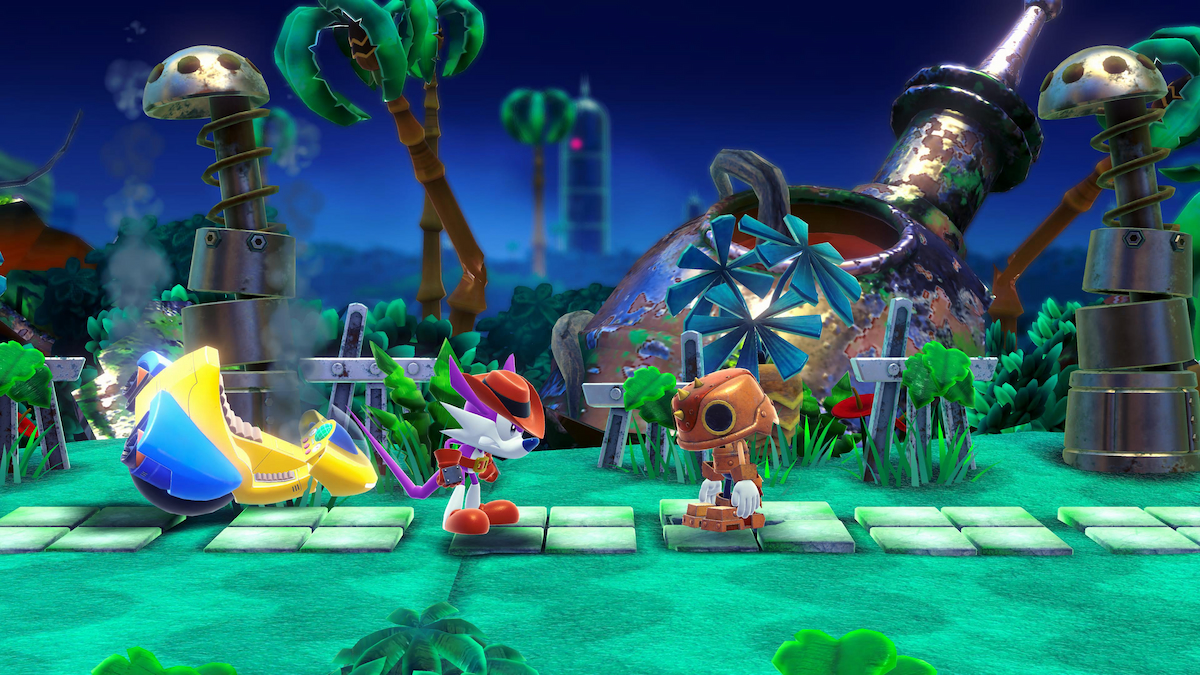
Can’t hold on much longer
The most deeply frustrating part of Sonic Superstars is that it does have moments of brilliance. Aside from the awful boss theme, several tracks in Sonic Superstars are genuinely fantastic. Additionally, individual levels can be really fun to play. Pinball Carnival and Cyber Station are generally great levels, with the latter having… well, one phase of a decent boss encounter. In certain moments, you can see the great game that Sonic Superstars could have been. That said, nine times out of ten, the game only ever feels this good when it’s borrowing tropes and ideas directly from past Sonic games.
The thought crossed my mind that Sonic Superstars feels like a Sonic fangame. But to say that would be an insult to the dedicated fanbase that has crafted absolutely excellent Sonic games through sheer love for the franchise alone. Sonic Mania proved that there are people who get Sonic. They understand what makes these games fun, what problems the games may have, and how to rekindle the magic that made 2D Sonic so amazing. By comparison, Sonic Superstars feels like something an AI would spit out if you told it to make a Sonic game. All of the bits and pieces are there, but it lacks the heart and passion that the classics had.
Frankly, Sonic Superstars feels like the first draft of a game that still needs a lot of fine-tuning. If you’re a devoted Sonic fan, you may play Superstars and appreciate it for those occasional highs. If that is you, know that I have no hard feelings about you or your gaming tastes. My frustration lies solely with the fact that a 2D Sonic the Hedgehog game shouldn’t stumble over itself like this. If anything, the moments I still managed to enjoy Superstars reinforced just how solid the Sonic formula is. Superstars just doesn’t cut it, and it’s hard to see so much potential squandered so carelessly.
Sonic Superstars is a game that understands the broad strokes of 16-bit Sonic games, but not any of the finer details. The new ideas it brings to the table are undercooked, and its multiplayer component is too poorly utilized to recommend. There are undoubtedly moments of genius here when everything lines up just right. But any goodwill I had for the game was ruined by the tedious, arduous boss battles. If you’re a Sonic fan who has thoroughly mastered the classics, you may find some entertainment here. But you deserve so much better than this.
[This review is based on a retail build of the game provided by the publisher.]
